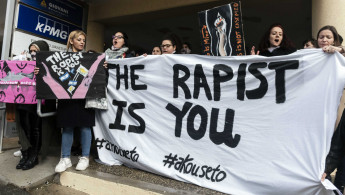UK raises concerns with Cyprus over teenager's conviction of lying about rape
A Cyprus court found the 19-year-old guilty of wilfully indulging in public mischief after she claimed she was raped by a group of young Israeli men while on holiday in Ayia Napa in July this year.
But the ruling by Michalis Papathanasiou at Famagusta's district court in Paralimni has been highly controversial. Critics say the trial was riddled with irregularities and the verdict may have been influenced by the island state's relationship with Israel.
"The UK is seriously concerned about the fair trial guarantees in this deeply distressing case and we will be raising the issue with the Cypriot authorities," a Foreign Office spokesman said on Tuesday.
The defence said it would lodge an appeal against the verdict on Monday.
"We believe there have been many violations in the procedure and the rights of fair trial have been violated," the woman's lawyer, Nicoletta Charalambidou, said.
If justice fails, Charalambidou said, the defence will take the case to the European Court for Human Rights.
'An onimous message'
The defence claims the woman was forced to sign a retraction of her original accusation after a lengthy questioning session which was neither recorded nor attended by a lawyer.
Human rights defenders have raised concerns that Cypriot authorities broke European Union law by failing to provide a lawyer and interpreter during the overnight questioning session.
 |
This, in effect, decriminalises rape and sends a signal to perpetrators that they can continue assaulting with virtual impunity |  |
This "culminated in her signing a retraction statement that her lawyers have argued she was coerced into signing by Cypriot police, and which an expert witness has testified would not have been written by a native English speaker", Alexandra Patsalides of pressure group Equality Now said in a statement on Monday.
"The police in this case have severely undermined the public's trust in the state's ability to appropriately investigate cases of rape and gender-based violence," the human rights lawyer said.
"Charging the teenager at the center of this complex case with the offence of Public Mischief... sends an ominous message to other survivors of sexual violence in Cyprus," Patsalides added.
"With convictions incredibly low and many women choosing not to come forward for fear of being blamed, this, in effect, decriminalises rape and sends a signal to perpetrators that they can continue assaulting with virtual impunity."
Legal aid group Justice Abroad said Judge Papathanasiou repeatedly refused to hear evidence about the alleged rape during the trial, insisting that the "guilt of the accused is proven" as she had "confessed" by retracting her statement.
Forensic pathologist Dr Marios Matsakis told the court the teenager's body showed marks and bruising "consistent with rape having taken place".
Protesters outside the court expressed solidarity with the defendant, wearing white scarves with an image of lips sewn shut printed on them and chanting "We are with you" and "We believe you".
"Everyone will find a reason not to believe her. That's the case with rape - no one will believe you," protester Helena Gonata said.
"We're trying to encourage women to talk. Many women are afraid to come forward."
A 'victim of political friendship'
|
|
Some believe the teenager was convicted out of Cyprus' desire to keep warm relations with Israel.
"We are here to defend a 19-year-old girl who has been horribly punished because of political interests," Andri Gioakatzi told The Guardian.
"She has had to pay the price of Cyprus's desire to have good relations with Israel. That is why she has been through this and they let all the Israeli boys go."
Another protester, Zelia Gregoriou, said: "This is certainly not the first case of rape in Cyprus and certainly not the first time that a rape complaint is ignored, but it also takes place at a very significant time when Cyprus is trying to reinvent its relationship with Israel both economically and as a partner in defence.
"There is no doubt that this young British woman is a victim of the need to seal that political friendship," she added.
The defendant's sentencing has been delayed until 7 January, when she could be ordered to pay a fine of up to 1,700 euros ($1,908) and spend up to a year in prison.





 Follow the Middle East's top stories in English at The New Arab on Google News
Follow the Middle East's top stories in English at The New Arab on Google News


